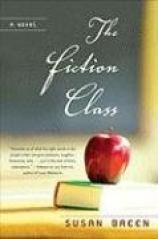Reading Group Guide
Discussion Questions
The Fiction Class

1. In “First Class: Getting Started,” we meet all of the members of Arabella’s ten-week writing course. Who, out of the twelve students, surprised you the most in terms of character development? For those who have taken any kind of community workshop, discuss Breen’s ability to create characters that reflect the types of people who enroll in these classes. How well does she avoid making them stereotypes or clichés?
2. Discuss and evaluate the structure of the novel. How do Arabella’s class lectures and writing assignments reflect, highlight, or provide insight into her personal life? How do they work as vehicles for flashback and foreshadowing? What keeps the lecture/classroom scenes from becoming formulaic?
3. Similarly, consider the ways in which Breen uses setting to parallel Arabella’s state of mind and/or reveal meaning. How accurately does she portray the atmosphere of a nursing home? How vividly could you picture the nursery school classroom in which the fiction class takes place?
4. Arabella isn’t always a sympathetic character. We see her typecasting and criticizing her students rather ruthlessly, and in the beginning of the novel she fails to see how she might be culpable for the rift in her relationship with her mother. What keeps us interested in Arabella as a character? What allows us to keep reading about her until the end of the book?
5. Discuss how Breen writes about the effects of diseases like multiple sclerosis and Parkinson’s. What does her writing reveal to you about the lives of people with these diseases and the lives of their caretakers?
6. Is there anything ironic about Chuck’s place as the romantic hero? How does he fit the role, and in what ways does he not? Do you think his relationship with Arabella will last? Does he change much in the novel, or is it simply Arabella’s perspective (of him, and others) that changes?
7. How did you feel that Arabella could never answer her mother firmly about her own beliefs about God, fortune-tellers, and miracles?
8. Before Arabella reads her mother’s short story, we see parts of the narrative interspersed between chapters. How, in these early stages, did the story about Joan and her hoped-for miracle work as a parable for what was happening in Arabella and Vera’s life? What did Vera’s story reveal --- not only about her relationship with Arabella, but about her perspective before and after her husband’s multiple sclerosis diagnosis?
9. Arabella says, “Theme is how you interpret the world.” Just as there can be more than one interpretation of the world, there can be more than one theme to a novel. What would you consider to be the central themes of this book? What would Breen have you believe about familial and romantic relationships, the nature of love, and the role of faith and hope in our lives?
10. Like all good literature, The Fiction Class contains symbols that reinforce the theme(s) of the novel. Perhaps the most obvious of these symbols is the perfect apple, which Chuck gives to Arabella early in the semester. Arabella considers various possibilities for the apple as a symbol, but how do you think it works to support the novel’s thematic development? What other symbols did you notice, or consider, when reading the book? What or who did these images and items symbolize?
11. The Fiction Class is a highly reflexive novel in that it contains or employs many of the devices Arabella talks about in her lectures. Did this make the novel more or less enjoyable to read? Were you conscious of the narrative’s plot development, pacing, character development, dialogue, and thematic development as you read the book? Did you learn anything from Arabella’s lectures? Did her lectures inspire you to try writing on your own?
12. Do you think that Vera’s vision of her husband (as described in Marvel’s letter) qualified as a miracle? Does it work as a plot device, connecting Vera’s short story with Arabella’s real life experience more solidly, or does it detract from the novel, and make it seem less realistic and genuine? Why do you think unhappy endings --- or, at the very least, endings that are neither happy nor sad --- are preferred in literary fiction?
The Fiction Class
- Publication Date: February 26, 2008
- Paperback: 296 pages
- Publisher: Plume
- ISBN-10: 0452289106
- ISBN-13: 9780452289109







